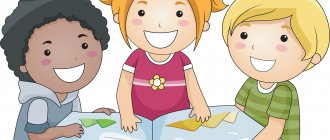A child is a small part of our society. He lives and develops among people, which means that he needs to communicate with others. A sociable person always feels confident in the company of people, regardless of their social status. It’s always interesting and comfortable to be with such a person; as a rule, they are the “soul” of any company. In order to achieve such results, a child, during his preschool childhood, goes through certain forms of communication.
Communication with peers is an important component of socialization
Stages of development of children's communication with peers
With the successful development of the baby, each of the following forms of communication is formed at a certain stage of preschool childhood.
From 2 to 4 years
- One of the first forms of communication with peers that a baby masters is considered situational and personal; it is characterized by a period from 1 to 6 months. At birth, the child has no need for communication. But its development does not stand still. A month later, the baby begins to respond to the presence of an adult. He begins to recognize them and react to their appearance. Primary communication is based on humming, babbling and the first simple words.
- The next form of communication that a child masters is of an emotional and practical nature.
Peculiarities of children's communication with each other
In the second to fourth year of life, when entering a children's group, the baby gains his first experience.
He likes to be among children, the child experiences increased attention to them and shows interest in the actions of other preschoolers. By the age of three, showing off his achievements, the baby tries to attract the attention of his peers to himself, in the hope of self-expression. Also, he takes part in the fun and pranks of other children with interest, enhancing the fun of the overall game.
The role of communication with peers - main points
Children under 4 years old
Up to 4 years of age, for children, their own importance in the children's team is of great importance.
When communicating with peers, they very often say: “you are my friend,” “you are my girlfriend.” If a child receives a positive response from a peer to such a remark, then he smiles, and vice versa, the phrase “no, I’m not your friend” can cause protest or tears in the child. Such a reaction suggests that in a peer the child is able to perceive only the attitude towards himself; the mood or actions of his friend do not matter in any way. At this age, a peer serves as a mirror image of himself for the child.
Communication problems appear from the age of 4
Children 4-6 years old
The next form of communication with peers is considered situational and business.
It is characterized by a period from four to six years. If a child’s development occurs in a preschool institution, then the baby is more attracted to communication with peers than with adults. By the age of four, the child is fluent in speech and has little experience of social life; these factors contribute to the development of role-play.
From forms of play activity alone, where actions with objects were leading, children begin to play role-playing games with their peers.
The first friends appear from the age of 4-5.
The social and communicative development of preschool children is formed in collective games. Games in the store, hospital, zoo teach children to negotiate, avoid conflict situations, and behave correctly in society. Relationships between preschoolers are more like business cooperation and are a priority, while communication with adults is secondary and more like consultations and advice.
By collaborating with peers, the child’s personality develops.
It is very important for him to be recognized and respected in the children's team. The child, by any means, tries to attract the attention of his comrades. In their facial expressions and views, he tries to find signs of a positive or negative attitude towards his person. In an emotional form, he can already express resentment or reproach other preschoolers for not paying enough attention to himself.
During this period, children tend to show interest in the actions of their comrades. They are their invisible observers. The children carefully, with signs of some jealousy, monitor the actions of their preschoolers - their peers, subjecting their actions to assessment and criticism.
If an adult’s assessment of another friend’s action does not coincide with the child’s views, then he may react to it in one of the most acute forms.
Communication disorders - which preschoolers have
. At 4-5 years old, in the process of communicating with adults, children ask them about some of the successes of their friends, while not forgetting to emphasize their own advantages against their background, but also about their own failures and mistakes in the conversation try not to mention it. At this age, a positive assessment by adults of a peer’s actions can upset the child, and vice versa, he rejoices at any of his failures.
By the age of 5, preschoolers' relationships with peers change. The comrade, in some form, serves as an object of constant comparison with his actions.
Thus, the child tries to contrast himself with his friend. Against the background of comparison with his own abilities and skills, the child learns to evaluate his qualities. This allows him to begin to look at his own actions “through the eyes of his comrades”, thus, a competitive and competitive principle appears in one of the forms of communication.
Children aged 6 should be able to communicate with a group
Senior preschoolers 6-7 years old
From the age of 6-7 years, communication between preschoolers and peers moves to a new level and is of an extra-situational and personal nature. Among the forms and means of communication, speech skills predominate. The guys spend a lot of time communicating. In friendship, stable selective preferences are observed.
Among the above forms, non-situational-personal communication has a special impact on the personality development of preschoolers. By the age of 7, in the process of daily communication with adults, children not only learn certain norms of behavior, but also successfully try to apply them in everyday life. They can distinguish bad actions from good ones, so they try to act in accordance with generally accepted standards of behavior. Looking at themselves “from the outside,” children are able to consciously manage their own behavior.
Psychological aspects of children's communication with peers
Children are well acquainted with some professions of adults (educator, salesperson, doctor), so they know how to choose the appropriate style of communication with adults.
Psychology of communication with a child and positive aspects
If all of a child's mistakes are highlighted while their strengths and victories are ignored, a tense atmosphere is created. The child will think that he is doing everything wrong, that he is a loser and is only upsetting his parents.
If you only tell a child what not to do - “don’t talk to adults like that”, “don’t do that”, “don’t say that”, he will rebel because he doesn’t understand how to do it “that way”. Adults have formed patterns, this is how it should be, this should not be done. At first the child does not have them, later he will have to stretch his cocoon of stereotypes in order to live in society
It is necessary to replace these phrases with incentives to action, and focusing on praiseworthy behavior. The child will switch gears and know what he needs to do to earn praise
And parents will receive an independent, psychologically mature child, with the right approach to life.
Take care of your children, they are the most precious thing we have!
Igor Fomichev, clinical psychologist,
expert at the Center for Special Research and Expertise.
The role of adults in shaping children’s communication with peers
The development of all forms of communication between children and peers is possible only under the direct guidance of an adult. The child must sequentially go through all its forms.
But it happens that a 4-year-old child does not know how to play with peers, and at 5 years old is not able to maintain a basic conversation.
Is it possible to catch up and teach a child to communicate with adults and peers?
There are special classes for this and they are proactive in nature. What does it mean? An adult provides a child with patterns of communication that the child is not yet familiar with. To do this, you need to learn to communicate well enough yourself. The main problem when organizing such classes is not just to demonstrate to the child a perfect, yet inaccessible form of communication - cognitive or personal, but the ability to lead the child, imperceptibly including him in the communication itself.
Story games - let them communicate
Based on the achieved level of communication, you can invite the child to play a game together, the number of participants should not exceed 5-7 children.
The peculiarity of the game is that an adult is assigned the role of both a leader and a participant: he must follow the rules of the game, evaluate the actions of preschoolers, and at the same time be, on an equal basis with other children, the same participant in the game. In the process of joint actions, children have the opportunity to focus on the player - the partner, and not be offended if they lose. Together with other children, they experience joy and feel their importance in playing together. When conducting such activities, shy or withdrawn children begin to feel at ease, free and easy. After playing together with adults, such children cease to feel fear in communication and freely turn to an adult with a request or question. Thus, the development of non-situational communication with peers and adults moves forward at a slow pace.
Children become more relaxed when playing together
Lack of independence
Naturally, a parent wishes only the best for his child and strives to protect him from a variety of troubles. But the children grow up, and adults never stop caring for them. A bad grade at school - the parent is in a hurry to negotiate with the teacher about retaking the homework, but does it for the child.
Of course, the influence of adults is important for children, but no less important is the ability to solve their problems independently. A parent should be a support, not a blank wall between the child and the world around him
Unadapted, relying on adults for everything, and unsure of their abilities, children only multiply these negative aspects as they grow up. Lack of independence leads to the child growing up infantile.
Recommendations for parents
Each child is individual. There are children with low self-esteem, aggressive, shy, conflict-ridden and withdrawn - all of them, to one degree or another, may experience communication problems. We propose to get acquainted with simple games and exercises aimed at correcting some forms of communication between preschoolers and peers.
The foundations of full communication are laid in the family
1. Exercise “Make a story.”
Invite your child to write a short story on the topic: “I love it when...”, “When I’m angry...”, “It bothers me...”, “When I’m offended...”, “I’m afraid...”. Allow your child to compose a detailed story and fully express his thoughts. Subsequently, all the stories can be played out, but the main role should be the narrator himself. Together with your child, you can think through and find ways to overcome certain situations.
2. Conversation “How to become yourself.”
During the conversation, you need to discuss and find out the reasons that prevent the child from being what he wants. Think with your child about ways to get rid of them.
3. Exercise “Drawing ourselves.”
The “Draw yourself” exercise will help your child cope with fears
Invite your child to use colored pencils to draw pictures of himself now and in the past. Then discuss the details of the drawing, find differences in them. Find out from your child what he doesn’t like and like about himself. With the help of this exercise, the child will be able to realize himself as an individual and look at himself from different sides.
These simple games will help increase the child’s attention to himself, help him see his feelings and experiences, and also help develop self-confidence.
They will teach children to be understanding of differences between peers and to see the individual characteristics of each child.
How to prevent psychological problems: raising children
To prevent the occurrence of psychological problems in children, it is necessary to talk with the child about everything that worries him, and constantly offer his help and protection. The sooner a problem is identified, the easier it is to solve it and prevent the development of a serious complex.
You should carefully observe how the child communicates with his peers. His communication and behavior can tell a lot about the presence of a problem and its nature. For example, if a child does his best to earn the favor of his peers, this indicates a lack of love, warmth and attention to him.
In addition, you should always remember that each child is individual, has his own character traits, emotional traits that should be taken into account in the process of education. You need to respect him, love him for who he is, with all his shortcomings and advantages.
Technologies
They have become so integral to our lives, especially in the entertainment sector. A modern person spends a lot of time on the phone or computer, watching funny videos on the Internet and communicating via instant messengers. Children are no exception. Often, a modern child spends time playing video games from an early age. Their dynamism and special effects capture his imagination; the information shown on the screen is easy to digest.
Problems begin when the child comes to school. Educational and fiction literature does not carry the same brightness that a computer monitor has, and studying is much more difficult than completing levels in your favorite game. Because of this, children quickly become bored with activities, and the interest that appeared at first due to a change in environment quickly fades away.
The habit of relying on high technology relaxes children and reduces their motivation to learn new things. After all, when a child can get any information by pressing a few keys, he stops appreciating it.






